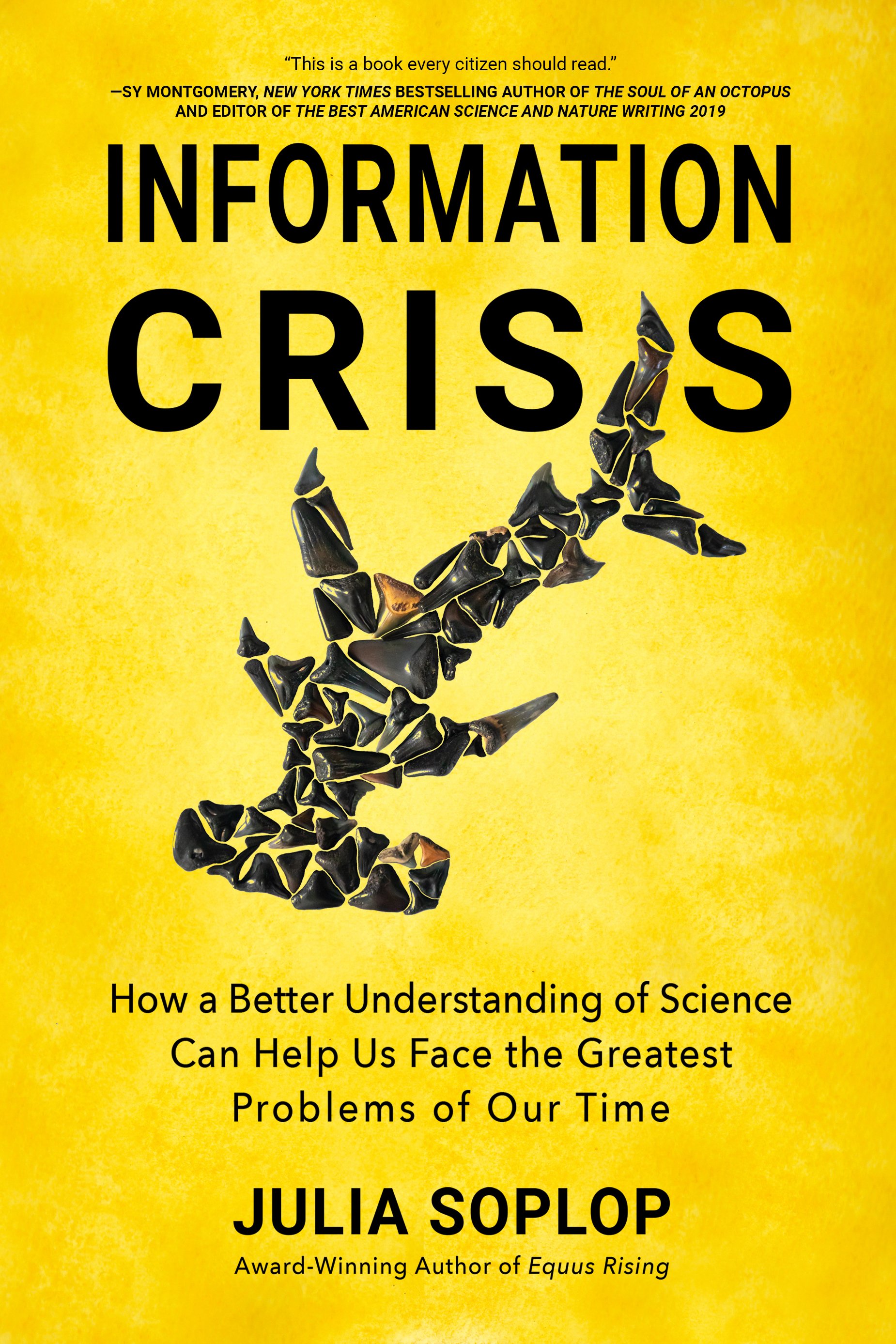How a Better Understanding of Science Can Help Us Face the Greatest Problems of Our Time
Information Crisis
By Julia Soplop
(Hill Press)
April 16, 2024
Winner of a Foreword Indies Book of the Year Award
Winner of an American Book Fest Best Book Award
Winner of an Independent Publisher (IPPY) Book Award
Or request the book at your favorite local bookshop. Available wherever books are sold.
"Amid a tsunami of shrill voices, deep fakes, and paid disinformation campaigns, it’s more important than ever that Americans learn to recognize and understand science and how to weigh the evidence. Julia Soplop's research is wide and deep. Information Crisis is chock full of vivid examples, surprising case studies, and fascinating data on everything from how American leaders bungled the COVID and climate crises, to how industry manipulates the way we think and remember. This is a book every citizen should read."
—SY MONTGOMERY, New York Times bestselling author of The Soul of an Octopus and editor of The Best American Science and Nature Writing 2019
"A brilliantly told, eye-opening read.”
—BOOKVIEW REVIEW (gold badge review)
"Weaving technological insights, neuropsychology, and fascinating case studies, Information Crisis hands us an urgently needed blueprint for science literacy in the digital age and beyond."
—WALLACE J NICHOLS, PhD, marine biologist and bestselling author of Blue Mind
"A journalistic triumph. In a world in which truth is subjective and distrust of experts is rampant, Soplop provides a compelling primer on the fundamentals of science literacy and their relationship to a strong and healthy society. With meticulous research and engrossing case studies, Soplop paints a comprehensive picture of the crisis and opportunity before us to save science—and democracy as a whole…This book belongs in every institute of higher education, health care office, statehouse, newsroom, and living room in America.”
—HEIDI SCHUMACHER, MD, assistant professor of pediatrics, University of Vermont Larner College of Medicine
“A well-documented and frightening assessment of America’s fraught relationship with science…Soplop balances her convincing research (which is backed by over 900 endnotes) with an accessible writing style geared toward readers unfamiliar with scientific scholarship.”
—KIRKUS REVIEWS
“Amidst the chaos and uncertainty that surround us, Information Crisis is a book that can help us right now. By illustrating how to effectively distill and evaluate a deluge of science and media information, Soplop mitigates our vulnerability and anxiety, while underscoring our ability to harness this evidence-based knowledge for positive change. Her masterpiece exemplifies a familiar adage of Maya Angelou—this book empowers us to know better, so that we can do better.”
—LISA BERGHORST, PhD, clinical psychologist, lecturer at Northwestern University Feinberg School of Medicine, and co-author of Exposure Therapy for Treating Anxiety in Children and Adolescents
"Meticulously researched, comprehensive, and accessible, this is a must-read for anyone seeking to understand the complexities of our current information landscape. A triumph.”
—THE PRAIRIES BOOK REVIEW
“If you want to understand how distortion of scientific information is threatening your democracy and your world, then read this book. In plain English, Soplop explains how messengers of fake science manipulate public perceptions to the detriment of all of us.”
—TOM LINDEN, MD, professor of medical journalism, University of North Carolina at Chapel Hill, and author of The New York Times Reader: Health & Medicine
“Thought-provoking, timely, and important. Blending absorbing narratives with extensive research, Soplop persuasively argues that bolstering science literacy is vital to creating a more functional society…She writes for a general audience, but her work will resonate just as much with scientists, physicians, journalists, and educators, as it illustrates the necessity of more effectively articulating science to the public—and the high stakes of neglecting to do so.”
—REMY SCALZA, freelance journalist
“[Information Crisis] is a book about solutions to problems and how they are found as well as how they are resisted or rejected...This is much needed even among those who study and practice in public health.”
—THOMAS RICKETTS, PhD, senior policy fellow and adjunct professor of health policy and management, University of North Carolina at Chapel Hill, and editor of Rural Health in the United States
Book description
The rapid and ubiquitous spread of information has failed to remedy one of humanity’s most enduring challenges: making accurate sense of the world. Instead, a constellation of factors influencing how we interact with information—and, in particular, scientific information—has prevented us from digesting and adequately confronting many of the greatest problems of our time, from climate change to pandemics.
The book, an essential read for non-scientists and scientists alike, offers both an analysis of this burgeoning crisis of (mis)information overload and a practical guide for navigating it. Soplop argues that becoming a more discerning and less vulnerable consumer, or producer, of health and science information is critical.
Soplop has created an indispensable primer for reimagining how we think about and communicate what science really entails, including its profound social value and its many limitations. She also presents a series of engaging case studies—the decades-long disinformation campaign to sow doubt in climate change, the schemes in the wellness industry, the push for pseudoscience in the science classroom, the century-old rhetoric of the anti-vaccination movement, and the nation’s unfathomable COVID-19 response—demonstrating how players across society employ common, and therefore easily identifiable, tactics of distorting scientific information to manipulate us for power and profit. In vivid prose, Soplop crafts a compelling and hopeful case that building a stronger foundation of science and media literacy can empower us to improve our lives both personally and collectively.
About the author
Julia Soplop is a science writer and the author of Information Crisis: How a Better Understanding of Science Can Help Us Face the Greatest Problems of Our Time (winner of an Independent Publisher (IPPY) Book Award), Equus Rising: How the Horse Shaped U.S. History (winner of an Independent Publisher (IPPY) Book Award and a Feathered Quill Book Award) and Documenting Your World Through Photography. Her work has appeared in numerous publications, including National Geographic, Summit Daily News, and Skiing. She also develops thought leadership for organizations that address issues of scientific or social concern. She holds a bachelor’s from Duke University and a master’s from the medical journalism program at UNC-Chapel Hill. She lives with her husband and three daughters outside of Chapel Hill, NC. You can read more about the Julia here.
Merch
Want some wearable shark merch? Click here for t-shirts and sweatshirts.
Book launch
Thank you to those who celebrated with us at the magical McIntyre’s Books in April 2024!
Press
Click here for the Information Crisis digital press kit.
Publication information
Information Crisis
Hill Press
April 16, 2024
Page Count: 465
Hardcover: 978-1-7351113-3-9
Paperback: 978-1-7351113-4-6
eBook: 978-1-7351113-5-3
Hardcover: $32
Paperback: $21
eBook: $9.99
SCIENCE/Philosophy & Social Aspects
SOCIAL SCIENCE/Media Studies
Wholesale ordering: Ingram or Hill Press
www.hillpressbooks.com





